China’s three telecom carriers have been scaling up efforts to provide a stable telecom network in Shanghai, including expanding computer cloud servers, enlarging coverage of 5G network and upgrading telecom communication speeds, as the financial and economic hub enters partial “pause” amid new waves of coronavirus outbreak, which leads to soaring demands for online network ranging from education, medical care, epidemic prevention to office work.
In a statement sent to the Global Times on Wednesday, China Mobile’s Shanghai subsidiary said it had expanded its network capacity by 300 computer servers on a contingency basis, and has set up a special on-site team to guarantee providing cloud technology service the first time.
The carrier also ran a trial pressure test for situations under which multiple high telecom demands erupt simultaneously at the beginning of March.
In downtown Huangpu district located in the city’s Puxi area, China Mobile has upgraded wireless network for local hospitals in 12 hours, so as to provide telecom support for anti-epidemic work. The internet speed of the district’s education institutions has also been upgraded to 10 Gbit per second to ensure online education is able to be delivered seamlessly.
China Mobile also helped build a 5G and wired broadband network for certain Shanghai companies in suburban Baoshan district, which remains operational with employees living in onsite accommodation under closed-loop management.
Shanghai authorities announced on Sunday night that they were splitting the city roughly into two zones along the Huangpu River for a total of nine days to allow for “staggered” citywide nucleic acid testing. Some of the city’s manufacturing and business services have been suspended, while others moved online, resulting in a sudden hike in network demands.
“As the combat against coronavirus outbreak enters crucial stage, digital technology also plays a key role in accelerating such work. For example, we also develop a cloud-message system, which helps officials gain a real-time update on the situation of local community, and send notification message to residents ‘point-to-point,'” a spokesperson of China Mobile told the Global Times.
On Kangding road, Jing’an district of Shanghai, street barriers are placed to manage traffic outside the neighborhood communities. Some residents were jogging, while sanitation workers were busy collecting garbage.Photo: Hu Gong



